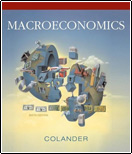Excerpt from "Preface"
"Before I started writing this book I had done quite a bit of research on economics education. As part of that research, Arjo Klamer and I had surveyed and interviewed graduate students in a number of top graduate programs. Two of the most disturbing things we discovered were that economic institutions and economic literature were being given short shrift in graduate economics education. For example, in response to the question, "How important is a knowledge of economic literature to being successful as an economist?" only 10 percent of the students responded that it was very important, while 43 percent said it was unimportant. In response to the question, "How important to achieving success as an economist is having a thorough knowledge of the economy?" only 3 percent said it was very important, while 68 percent said it was unimportant.
I believe that the majority of the profession is concerned with these results. Certainly the students we interviewed were concerned. They said they believe that institutions and literature were very important. Their survey responses simply indicated their perception of how people succeed in the profession, not that the current situation was the way it should be. Almost all economists I know believe that students need to know economic literature and have a thorough knowedge of the institutions. without the appropriate background knowledge of institutions and literature, all the technical skills in the world aren't going to provide one with the economic sensibility necessary to understand what's going on in the economy or to decide whether or not a model is relevant.
As I thought about these results and considered my own teaching, I realized that the problem was not only in graduate schools; it had filtered down to undergraduate texts. As I looked through the texts, I saw excellent discussions of technical issues and of models, but little discussion of economic sensibility. These books didn't even try to provide the intellectual context within which those models were to be applied. The standard texts had settled into teaching technique for the sake of technique and had shifted away from teaching economic sensibility.
I decided that if I were serious about playing a role in reinstituting economic sensibility and a knowledge of institutions and literature in economics education, I would have to write an introductory textbook that did that. I took it as a challenge. Meeting that challenge was what drove me to write this book; it is what kept me going when all my rational instincts told me it was too much time and too much work." |


